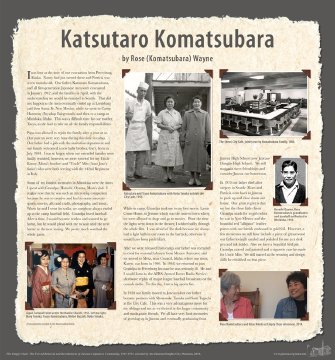|
Description
|
| Katsutaro Komatsubara Family by Rose (Komatsubara) Wayne I was four at the time of our evacuation from Petersburg, Alaska. Nancy had just turned three and Patricia was seven months old. Our father, Katsutaro Komatsubara, and all first-generation Japanese men were evacuated in January 1942, and the families in April, with the understanding we would be reunited in Seattle. That did not happen as the men eventually ended up at Lordsburg and then Santa Fe, New Mexico, while we went to Camp Harmony (Puyallup Fairgrounds) and then to a camp at Minidoka, Idaho. This was a difficult time for our mother, Tsuyo, as she had to take on all the family responsibilities. Papa was allowed to rejoin the family after a year or so. Our parents were very busy during this time in camp. Our father had a job with the sanitation department and our family welcomed a new baby brother, Gary, born in July 1944. I was so happy when our extended families were finally reunited; however, we were worried for my Uncle Kenny (Mom's brother) and "Uncle" Mits (Aunt June's fiancé) who were both serving with the 442nd Regiment in Italy. Some of my fondest memories in Minidoka were the times I spent with Grandpa (Harushi) Oyama, Mom's dad. I realize now that he was such an interesting companion because he was so creative and had so many interests-sports, movies, arts and crafts, photography, and music. When he and I went for walks, we somehow always ended up at the camp baseball field. Grandpa loved baseball. After a time, I would become restless and wanted to go home, but he would plead with me to wait until the next batter or the next inning. We pretty much watched the whole game. While in camp, Grandpa took me to my first movie, Lassie Come Home, in Jerome which was the nearest town where we were allowed to shop and go to movies. From the time the lights went down in the theater, I sobbed softly through the whole film. I was afraid of the dark because we always had a light bulb in our room in the barrack; otherwise it would have been pitch black. After we were released from camp, our father was recruited to cook for seasonal laborers from Mexico (braceros) and we moved to Mesa, near Council, Idaho, where our sister, Karen, was born in 1946. In 1948, we returned to join Grandpa in Petersburg because he was seriously ill. He and I would listen to the AFRS (Armed Forces Radio Service) shortwave replay of major league baseball broadcasts on the console radio. To this day, I am a big sports fan. In 1950 our family moved to Juneau when our father became partners with Shonosuke Tanaka and Sam Taguchi at the City Cafe. This was a very advantageous move for my siblings and me as we thrived in the larger community and made many friends. We all have very fond memories of growing up in Juneau and eventually graduating from Juneau High School (now Juneau-Douglas High School). We still maintain these friendships and consider Juneau our hometown. In 1973 our father died after surgery in Seattle. Mom and Patricia went back to Juneau to pack up and close down our house. One great regret is that we lost the three little chests Grandpa made for us girls when he was in New Mexico and the beautiful red "alligator" leather purses with our initials embossed in gold foil. However, a few mementos we still have include a piece of greasewood our father lovingly sanded and polished for use as a desk pen and ink holder. Also we have a beautiful bird pin Grandpa carved and painted and a cigarette case he made for Uncle Mits. We still marvel at the weaving and design skills he exhibited on that piece. Image Captions (All images courtesy of the Komatsubara family.): Japan Cultural Event at the Methodist Church, 1953. Left to right: Mary Tanaka, Tsuyo Komatsubara, Midori Buzzell, Nobu Tanaka. Katsutaro and Tsyuo Komatsubara with Nobu Tanaka Outside the City Café, 1955. Rose Komatsubara and Alice Hikido at Empty Chair interview, 2014. Harushi Oyama, Rose Komatsubara's grandfather & baseball enthusiast in Minidoka, 1943. The (New) City Café, jointly run by Komatsubara Family, 1960. |
Katsutaro Komatsubara Panel
-The Empty Chair: The Forced Removal and Relocation of Juneau's Japanese, 1941-1951
-Permission to use this image may be obtained by contacting museum staff.

All images are the property of the Juneau-Douglas City Museum. No image may be copied, downloaded or reproduced without the express permission of the Juneau-Douglas City Museum.

All images are the property of the Juneau-Douglas City Museum. No image may be copied, downloaded or reproduced without the express permission of the Juneau-Douglas City Museum.